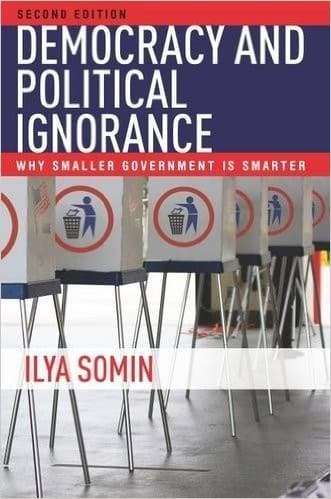The Volokh Conspiracy
Mostly law professors | Sometimes contrarian | Often libertarian | Always independent
The "Big Sort" and other potentially harmful political effects of voting with your feet

The just-published second edition of my book Democracy and Political Ignorance: Why Smaller Government is Smarter argues that we can reduce the harm caused by widespread political ignorance by limiting and decentralizing government power, which will enable more issues to be decided by "voting with your feet" instead of ballot box voting. Foot voters have much stronger incentives to acquire information and use it wisely than ballot box voters do. This is the second in a series of posts discussing some of the new issues addressed in the new edition (for the first, see here).
One of the criticisms most commonly raised against the first edition is the idea that increased foot voting will exacerbate the "Big Sort": the supposed tendency of people to cluster in communities of the politically like-minded. In a famous 2008 book of the same name, journalist Bill Bishop argues that this trend increases political polarization and our already strong tendency to ignore or dismiss opposing points of view. My proposal to expand opportunities for foot voting could potentially make the situation even worse.
I. Why the Big Sort is not as Big a Deal as Many Think.
I think this issue cannot be lightly dismissed, especially in an age of rampant and growing partisan bias. Nonetheless, the concern is overblown. Here are some of the reasons why (which I address in greater detail in Chapter 5 of the new edition of my book).
One problem with the Big Sort theory is that the data doesn't seem to support the notion that we are more ideologically segregated than we were several decades ago. That does not rule out the possibility that increased foot voting would cause more of a big sort. But it should make us more skeptical of the theory.
A deeper problem with the Big Sort idea is that people who vote with their feet do not in fact tend to make choices that align neatly on a left-right or Red-Blue spectrum. For example, the data suggest that many people gravitate towards jurisdictions that are both socially tolerant and have relatively free market policies that lead to cheaper housing and more job opportunities. Many are also willing to move to jurisdictions that don't match their partisan biases, because they have specific policies that the migrants expect to benefit from. For example, in recent years, red states like Texas have attracted many migrants from liberal states on the East and West coasts, because their less restrictive zoning rules lead to lower housing costs. More generally, there is considerable diversity in the amount of diversity (of many types) that people prefer to have in their communities. That, too, cuts against any monolithic tendency to move towards areas largely populated by those who have the same political views as yourself.
Even if foot voting does increase ideological segregation to some degree, that might not be such a bad thing. Sadly, data shows that most Americans, rarely discuss politics with people who hold significantly different views from their own - even if they live in politically diverse areas. Greater residential segregation by ideology may not make that tendency much worse, because people are very good at avoiding challenges to their views even in its absence.
Some degree of increased segregation may, however, increase diversity in policies between jurisdictions, which in turn can stimulate more effective interjurisdictional competition. Diminished diversity within institutions can sometimes promote beneficial diversity across institutions, by making each more distinctive from the rest.
II. What about the Opposite of the Big Sort?
In contrast to people who worry about the Big Sort are those who fear the exact opposite effect: an influx of migrants into their state who will undermine its distinctive political identity because the newcomers' views diverge from those of current residents. For example, some Texas conservatives fear that their state's politics will be altered by the migration of liberals from blue states. This possibility cannot be totally dismissed.
But the risk is not nearly as severe as it might seem. It is mitigated by the fact that recent migrants to a state tend to vote less often, contribute less to political campaigns, and otherwise exercise political influence at much lower rates than long-time residents. Moreover, for selective migration to have a major impact, it has to be very large relative to the current population and severely skewed in one direction. For example, assume that a wave of migrants amounts to a whopping 10% of the total population and splits 60-40 in favor of the Democrats. Its net effect on the partisan balance will only be a shift of 2% of the vote - assuming the migrants vote at the same rate as previous residents, which is rarely the case. As I explain in the book, truly enormous migration from neighboring blue states has had relatively little effect on New Hampshire's generally free market public policies (though it has made the state's Senate and congressional races far more competitive than before). The difficulty of shifting a state's political balance through migration does have a downside: it makes it harder for migrants to have a beneficial political effect, as well as a negative one.
In sum, both those who fear the Big Sort and those who worry about the exact opposite effect raise important issues worthy of serious consideration. But neither significantly undermines the case for expanded foot voting.
Obviously, the Big Sort and its opposite are far from the only possible objections to foot voting. They are merely ones that have been unusually prominent in recent years. In the book, I also cover more traditional concerns, including the "race to the bottom," moving costs, and claims that political decentralization is bad for racial and ethnic minorities.


Show Comments (0)